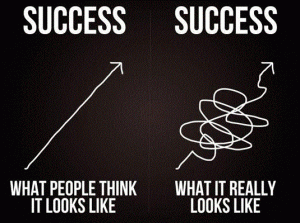 Winston Churchill was the cigar-chomping, balding son of an English aristocrat and American socialite and one of the greatest wartime leaders the modern world has seen. I am none of the above. I’m also not much of a war history buff, but I was surprisingly moved by his story when visiting the truly fascinating Cabinet War Rooms recently.
Winston Churchill was the cigar-chomping, balding son of an English aristocrat and American socialite and one of the greatest wartime leaders the modern world has seen. I am none of the above. I’m also not much of a war history buff, but I was surprisingly moved by his story when visiting the truly fascinating Cabinet War Rooms recently.
“Success is not final, failure is not fatal: it is the courage to continue that counts.”
Sure, we remember Churchill for his incredible achievements as a World War II leader but it’s worth noting he also made poor decisions both during WWI and WWII. The Dardanelles campaign during World War I is a particularly poignant example as Churchill strongly advocated this naval maneuver that tragically resulted in more than two hundred thousand lives being lost.
At the age of 40, Churchill resigned from his role as First Lord of the Admiralty, endured very bad press, and spent time in the proverbial career penalty box for this ill-considered decision. However, rather than being haunted by this mistake and retiring to the country to pursue a more private lifestyle, Churchill continued to lean forward and influence the political conversation throughout his career and ultimately earn an honored place in British history.
Churchill’s story reminds us of two important things. The first is that we all make bad decisions. While we no doubt all try to make the best decisions at all times, the reality is they won’t always prove to be right in the end. The second is that bad decisions should not prevent us from recovering, pressing on confidently, and making better decisions in the future.
Given the reality that leading a department or business often requires taking teams into new, unknown territory, it seems pretty impossible for any leader to avoid all missteps during one’s career. Like Churchill, bad decisions shouldn’t stop us from pursuing our dreams if, in the grand scheme of things, we actually have a knack for the career we pursue.
The courage to continue when you encounter failure has been a particular challenge for me. First, I tend to be quite self-critical — I struggle with the double whammy of being raised Catholic with a big dose of Confucianism. And as you might guess, I’ve made my fair share of mistakes, as I’ve had to make all sorts of decisions on topics from staffing to strategy over the years.
Annoyingly, all mistakes seem to share the unfortunate habit of looking even worse in hindsight. As a result, I have spent a lot of time beating myself up for poor decisions and have it affect my confidence. Reminding myself that running a business is a journey of ups and downs has helped. Knowing that Churchill could keep “buggering on” and make important, positive contributions after some poor decisions makes it even more real. Learn from mistakes, for sure, but don’t be fearful, or worse — run away — because of them.
Interestingly, one of Churchill’s early WWII mistakes helped prompt the resignation of his boss — Prime Minister Neville Chamberlain — and result in Churchill’s ascension into the Prime Minister role. Ah, the irony. That didn’t stop him from believing he was entirely ready for the role, though. And clearly, he was right. I suspect his bad decisions taught him as much as his successes in preparing him for his job of a lifetime.
PS – if you have a chance to visit London, definitely consider adding the Churchill Cabinet War Rooms to your list of places to visit. Right by Westminster Abbey and Big Ben, this warren of underground rooms that used to direct England’s movements is definitely worth the trip.
Conversation starters: What kinds of bad decisions have you made? What have you learned from them?


One Response to “Winston Churchill and the courage to continue”
Hi, saw your link at HackerNews… I’ve also recently had my eyes opened to Winston Churchill, what we can learn from him… here’s some amazing archival footage:
http://www.amazon.com/Churchill-The-Finest-Hours-n/dp/B0088FS286/ref=sr_1_1
When The Great Courses has this set on Churchill on sale again, it might inspire even further:
http://www.thegreatcourses.com/tgc/courses/course_detail.aspx?cid=807
(Thing that blew me away is how he discovered painting in middle age… also learned that even the best of us are flawed.)